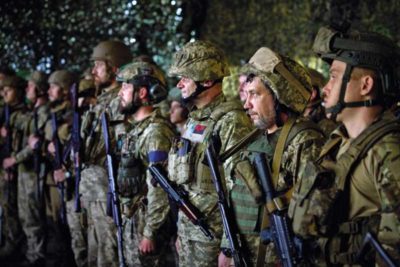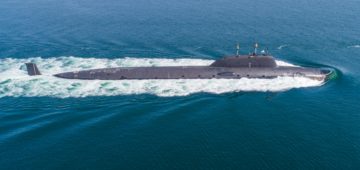
The breaching of the Kakhovka dam last month (June) created a major obstacle for the Ukrainian summer offensive, whose top objective is cutting off the so-called land bridge between the Crimean Peninsula and Russia.
As related in previous editions of this magazine, Ukrainian naval special forces were active across the broad waterway of the Dnipro, and Moscow likely anticipated a major effort to cross it in the Kherson region.
This would be followed by a thrust from Kyiv’s forces to reach and capture the Isthmus of Perekop, where railway and roads into Crimea converge.
Aside from retrieving territory annexed by Russia in 2014 (as a precursor to Moscow’s invasion of the Donbas) Ukraine’s forces cutting off the peninsula would be a massive blow to the enemy war effort. Crimea is host to air, sea and land forces that have played a major role in attacks on Ukraine, not least its main port of Odesa. To follow on from the Kerch Strait Bridge attack of October last year – that structure carries railway and road links to Crimea across the entrance to the Sea of Azov, on the eastern side of the peninsula – in late June – UK supplied Storm Shadow missiles were used by Ukraine to damage bridges at Chonhar.
They are a vital link between Crimea and the Kherson Oblast, and for some days it meant all traffic had to go via Perekop.
The Kerch Strait Bridge, meanwhile, had only just reopened to both road and rail traffic and may be subject to attack again. The ultimate objective for Ukraine is to retrieve the entire Crimean Peninsula of course and also its territory on the mainland – the land bridge – hence there are also Ukrainian attempts to break open the Russian front line and reach Melitopol and Berdiansk.
As this commentary is being composed the Ukrainians have not yet managed to do that.
The Wagner mercenary army rebellion of late June provided only a fleeting distraction from the struggle in Ukraine, where stiff Russian resistance continued unhindered by such shenanigans.

The Ukrainians may yet succeed in punching through to the sea and might have done so by the time this commentary is published.
While much was made of the fighting around Bakhmut earlier in the year – and the importance of the Donbas – it is Crimea and sole control of the northern Black Sea coastal zone that Putin is determined will stay in Russia’s hands. This is irrespective of the price paid by humans in hanging onto his newly conquered territory. The Russians will do their utmost to stop the Ukrainians achieving their goal of reaching the sea – hence the dam-busting ploy.
They are chaotic and wasteful in terms of their own lives and equipment, but that is the Russian way of war.
Evidence of a determination to hang onto all territories around the Sea of Azov came on June 13 when Putin signed into law an abrogation of the 2003 ‘Treaty between the Russian Federation and Ukraine on Cooperation in the Use of the Sea of Azov and the Kerch Strait.’ Putin regards it as redundant given the accession of the Donetsk People’s Republic, the Zaporizhzhia Region, and the Kherson Region to the Russian Federation. Consequently, “their coasts belong to the Russian Federation alone,” said Putin. Speaking days later at the plenary session of the St Petersburg International Economic Forum, Putin played the victim card and claimed his country was forced to intervene and allow the Ukrainian territories to accede to Russia (and then support them militarily in defence of their decision).
The economic forum highlighted another aspect of the war in Ukraine and that is Russia still having its global supporters despite it clearly being the aggressor.
When asked about the pressure his country has faced to “join the sanctions against Russia in one way or another and not to cooperate with Russia, at least not to buy Russian armaments”, Algeria’s President Abdelmadjid Tebboune responded: “I can answer this question with literally one phrase: the Algerians were born free and will remain free.” His answer was perhaps partly in the context of Algeria having to endure the tyranny of French colonial rule and fighting a vicious war of independence, something that tempers its foreign policy rather than visceral anti-Western sentiment (though he did refer to Putin as his “great friend”).
However, it highlighted the fact that many Asian, African, Latin American and Middle Eastern, or at least developing world states, if not openly siding with Russia, are sitting on the fence over the conflict in Ukraine. They would probably prefer not to see Russia lose. Some of this is perhaps down to what Putin himself highlighted in a long monologue on how Russia’s economy had weathered Western sanctions and was doing very well.
Some countries are still reliant on Russia for fuel and especially grain, investment, or are otherwise economically linked. Therefore, they are perhaps compelled to adopt the positions they do without being rabidly anti-Western states or effectively Russian clients such as Belarus, Iran, North Korea and Syria. Algeria is Russia’s third largest economic partner.
India is notably reliant on Russia for arms and fuel, and has weathered much pressure to place sanctions on Moscow as it tries to court the West in order to protect it from China.

The realpolitik amity between Putin and various nations, including notable Arab states and China, on show at St. Petersburg, came ahead of the Wagner ‘march on Moscow’ which will have been watched closely in their capitals. At the time of writing Putin remains the Russian leader (even if weakened) and whoever eventually succeeds Vlad the Invader will likely court the fence-sitters and “great friends” just as keenly. And they will be keen to use Russia for various objectives – political, economic and military.





Comments
Sorry, comments are closed for this item